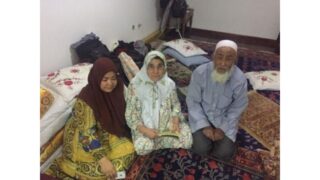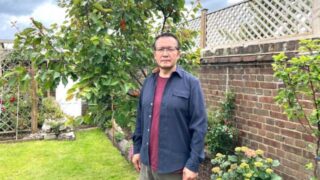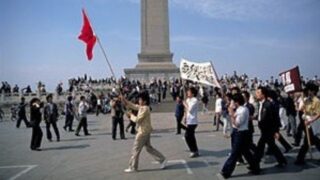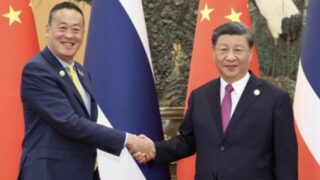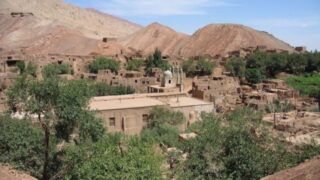Xi went to Urumqi with all the CCP top leaders. He told local authorities that “illegal religious activities” have not been eradicated and Uyghurs have not been fully “Sinicized.”
by Ma Mingze
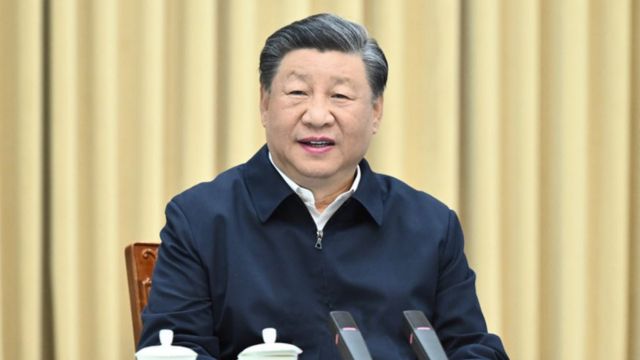

Xi Jinping has finally answered international criticism about repression in Xinjiang and the genocide of the Uyghurs. His answer is—repression is not harsh enough and should indeed be increased.
Xi stopped in Urumqi on August 26 on his way back from the BRICS meeting, and organized a conference where he summoned the Xinjiang CCP Committee, the government of the Xinjiang Uyghur Autonomous Region, and the Xinjiang Production and Construction Corps (a paramilitary corporation that runs the economy of the so-called autonomous region—and much more). The two main CCP henchmen in Xinjiang, CCP Secretary Ma Xingrui, and Chair of the Autonomous Region Government Erken Tuniyazi, also publicly reported to Xi.
Xi also brought to Xinjiang most of the CCP key leaders. The lineup was indeed impressive. It included Foreign Minister Wang YI; Minister of Public Security Wang Xiaohong; Shi Taifeng, the head of the United Front Work Department; Li Ganjie, the leader of the CCP Organization Department; Chen Wenqing, the secretary of the CCP Central Political and Legal Affairs Commission; General He Weidong, Deputy Chair of the Central Military Commission (whose Chair is Xi Jinping himself); He Lifeng, Director of the CCP Office of the Central Financial and Economic Affairs Commission; and senior Politburo member Cai Qi.
The event was not secretive. It was reported by the official Xinhua News Agency and by the state television CCTV. Clearly, Xi Jinping wanted China to know what he had to say to local Xinjiang CCP bosses.
What he said is that he is not pleased. Xinjiang still has “outstanding stability problems,” he claimed. Xi told his audience, in so many words, that repression should increase. “It is necessary, he explained, to improve the mechanism for preventing and defusing major risks and hidden dangers, combine the anti-terrorism and anti-separatist struggle with the promotion of the rule of law and a strong stability maintenance work, treat both symptoms and root causes, adopt comprehensive measures, and strengthen in-depth governance.”
The problem, Xi stated, is that “bad” religion has not been eradicated. “It is necessary to further promote the Sinicization of Islam and effectively control the various illegal religious activities,” he emphasized. One way of doing it is multiplying the efforts to replace Uyghur and other local languages with Mandarin. “You should resolutely promote education in the national standard spoken and written language, and gradually improve the awareness and ability of the masses to use the national standard spoken and written language,” Xi said.
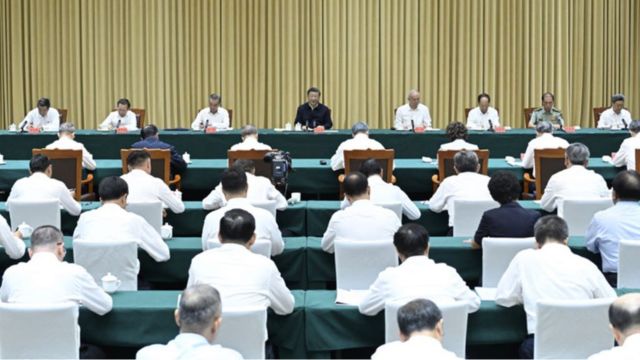

Xi took to Urumqi the chief of the United Front, which is the body in charge of international propaganda, and insisted that “it is necessary to strengthen positive publicity,” “tell the story of Xinjiang” as the CCP presents it to international media, and “refute all kinds of false public opinion, negative public opinion, and harmful speech in a targeted manner. It is also necessary to increase the opening up to tourism in Xinjiang and encourage domestic and foreign tourists to travel to Xinjiang,” obviously under CCP’s supervision and hoping they will become the Party’s allies in telling the official lies to China and the world.
Xi’s speech was about stick more than carrot. He suggested to import into Xinjiang the “Fengqiao experience.” Chinese know what this means. The Fengqiao movement was launched in Zhejiang province by Chairman Mao in 1963 as a prelude to the Cultural Revolution. It consisted of the “four cleanups” in which four groups of “reactionary elements”—“landlords,” “wealthy peasants,” “counterrevolutionaries” and “evildoers”—were detained, publicly humiliated, tortured, and in some cases killed. “Counterrevolutionaries” and “evildoers” included those who still adhered to independent forms of religion. Today they would be called “non-Sinicized,” which does not mean not adapted to Chinese culture but not remolded and made totally subservient to the Communist Party. Threatening Xinjiang with the Fengqiao experience announces a new wave of repression. It seems that Xi really believes that the international damage to China’s reputation may be controlled by recruiting a few useful idiots who will come as “tourists.”



